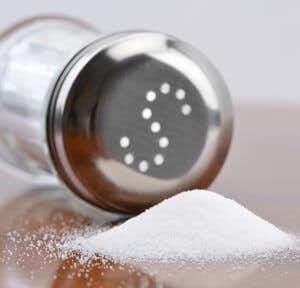
When epidemiologists and cardiologists give advice about hypertension, they often recommend that we cut back on salt (Journal of the American College of Cardiology, Oct. 11, 2016). Strict salt restriction remains somewhat controversial, however (Lancet, July 30, 2016). Most people find it hard to lower their sodium intake to levels recommended by the American Heart Association. Perhaps it’s time to focus more attention on increasing potassium intake by using a potassium salt substitute. That’s the conclusion of studies from different parts of the world. The most recent study collects results from 16 different randomized controlled trials.
Finding a Good-Tasting Stand-In for Salt:
Getting people to cut back on salt, however, is a challenge. That’s because people like the taste of salt. Imagine chips, pretzels or chicken soup with no salt. Is it possible to have a salty flavor without sodium chloride? Could a potassium salt substitute be beneficial.?
One of the problems for people trying to follow a low-sodium diet is taste. Potassium salt substitutes often have a bitter aftertaste. Researchers at the National Heart, Lung and Blood Institute have developed a salt substitute with 75% sodium chloride and 25% potassium chloride. This mixture appears to be indistinguishable in flavor from regular salt. Investigators have tested similar mixtures–with varying ratios–in careful studies.
The Meta-Analysis:
A new study in the Annals of Internal Medicine examined 16 randomized controlled trials of salt substitution (Annals of Internal Medicine, April 9, 2024). Over 30,000 volunteers were part of these trials. These studies showed that replacing some of the sodium chloride in salt with potassium chloride reduces sodium in urine and lowers blood pressure. The researchers also found that salt substitutes reduced mortality during the studies. Salt substitution was especially helpful for the Chinese people in the meta-analysis. Most of the studies, especially the largest ones, took place in China or Taiwan.
Some people don’t like the taste of potassium chloride by itself. However, a mixture of potassium and sodium chloride seems palatable for many individuals and could help with blood pressure control and cardiovascular health. Keep reading for more details on previous studies.
Does a Part-Potassium Salt Substitute Help with Blood Pressure?
The scientists tested this combination in six villages in rural Peru. They supplied some of the villages with the salt substitute, while the others received ordinary table salt. After three plus years, rates of hypertension had fallen by about 50% in the villages using the substitute. Average blood pressures of individuals also became lower. Although the average drop in systolic blood pressure was only about 2 points, this could reduce the rates of stroke and heart disease in a population over time. One word of caution: people with kidney disease may not be able to handle extra potassium and might not do well on this product.
Could a Salt Substitute Lower Sodium Intake?
In the US, scientists used data from the National Health and Nutrition Examination Survey to model sodium intake (American Journal of Clinical Nutrition, online March 23, 2021). If people replaced table salt with a potassium chloride salt substitute, they could lower their sodium intake to around 3,000 mg a day. Using a salt substitute did not lead to excessive potassium intake.
Does a Potassium Salt Substitute Lower Blood Pressure?
Of course, models showing a lower sodium intake are one thing. Evidence that using potassium chloride instead of sodium chloride actually lowers blood pressure is another.
To this point, researchers recruited 500 people in rural India with high blood pressure. They provided the volunteers with either ordinary salt (sodium chloride) or potassium chloride salt substitute for home use (American Journal of Clinical Nutrition, online March 30, 2021). After three months, those using the salt substitute had lowered their systolic blood pressure by 4.6 points.
Participants said the substitute tasted like salt. Consequently, this appears to be a low-cost and effective intervention.
Some people can’t tolerate the taste of potassium chloride however, so this kind of salt substitution won’t work for everyone. Those taking ACE inhibitors like lisinopril or ARBs such as losartan for hypertension must avoid extra potassium. This might come from salt substitutes or other concentrated sources such as supplements.
Learn More:
Fruits and vegetables are great sources of potassium. That might help explain why they are so good for our health. Here is a list of super sources that might help you increase your potassium intake whether or not you like the taste of a potassium salt substitute. You may also wish to consult our eGuide to Blood Pressure Solutions with suggestions for lifestyle approaches as well as drugs to control hypertension.
Citations
- Cook NR et al, "Sodium intake and all-cause mortality over 20 years in the trials of hypertension prevention." Journal of the American College of Cardiology, Oct. 11, 2016. DOI: 10.1016/j.jacc.2016.07.745
- Mente A et al, "Associations of urinary sodium excretion with cardiovascular events in individuals with and without hypertension: a pooled analysis of data from four studies." Lancet, July 30, 2016. DOI: 10.1016/S0140-6736(16)30467-6
- Greenwood H et al, "Long-term effect of salt substitution for cardiovascular outcomes : A systematic review and meta-analysis." Annals of Internal Medicine, April 9, 2024. DOI: 10.7326/M23-2626
- Murphy MM et al, "Potassium chloride-based replacers: modeling effects on sodium and potassium intakes of the US population with cross-sectional data from NHANES 2015–2016 and 2009–2010." American Journal of Clinical Nutrition, online March 23, 2021. https://doi.org/10.1093/ajcn/nqab020
- Yu J et al, "Effects of a reduced-sodium added-potassium salt substitute on blood pressure in rural Indian hypertensive patients: a randomized, double-blind, controlled trial." American Journal of Clinical Nutrition, online March 30, 2021. DOI: 10.1093/ajcn/nqab054

